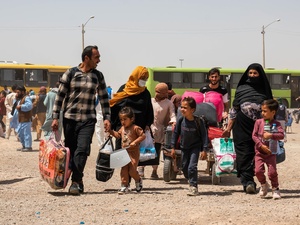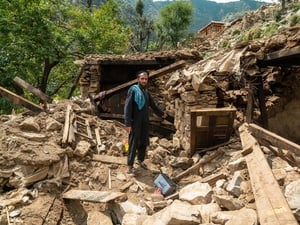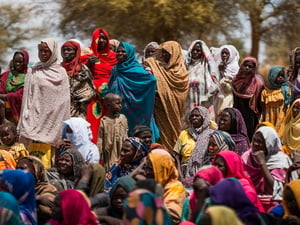Afghanistan: Returns from Iran over 600,000
Afghanistan: Returns from Iran over 600,000
A milestone has been passed in the return of Afghans from Iran, with the return of more than 600,000 Afghans since the repatriation programme got underway in April 2002.
In order to go back, Afghans in Iran must register at one of 11 centres established throughout the country. They then load their personal effects on trucks and board buses provided free to the returning refugees, who also receive food and water at way stations along the route to the Afghan border at Dogharoun/Islam Qala. The returning Afghans are channelled through Herat, western Afghanistan's main city, where they receive financial assistance for transport back to their home areas, along with UNHCR kits containing basic items and WFP [World Food Programme] food aid.
The vast majority of Iran's Afghans go back to central and northern Afghanistan, while a quarter remain in the west. Some returnees may also qualify for housing material distributed by UNHCR's shelter programme, which is providing building materials for up to 270,000 returnees this year. Other UNHCR projects benefiting returning refugees include water and irrigation programmes to assist rural communities and farmers.
The repatriation process is governed by a tripartite agreement between the Afghan and Iranian governments and UNHCR. At a recent tripartite meeting earlier this month in Geneva, the parties reaffirmed their commitment to the voluntary nature of the repatriation process. They also agreed to focus in the coming months on identifying and removing any obstacles to repatriation, and stressed the importance of reintegration and reconstruction in Afghanistan as long-term solutions to the refugee problem.
Iran agreed to facilitate the involvement by Afghan refugees in the Constitutional Loya Jirga and the upcoming elections set for mid 2004. Representatives from Ghazni and Bamyan provinces are also set to visit Iran and meet with refugee communities. Afghanistan's ongoing infrastructure and reconstruction needs were highlighted during the recent talks in Geneva as significant hurdles that must be addressed to help the country absorb its refugees.
In Iran, we are currently working to keep the country's Afghan refugees informed about the repatriation programme, which is planned to operate until March 2005. Mobile teams are reaching out to local Afghan communities in the more remote parts of the country, and a visit of Afghan leaders is being planned for later this year to talk to refugees about how they can contribute to the reconstruction of Afghanistan.
We hope to accelerate returns from Iran over 2004. More than 223,000 Afghans have gone back so far this year, while some 376,000 Afghans returned in 2002. UNHCR estimated earlier this year that there were some 1.1 million Afghan refugees in Iran. UNHCR is also focusing on informing Afghan refugees in Iran about the repatriation programme, which will operate until March 2005.









